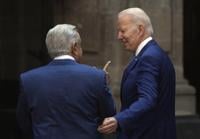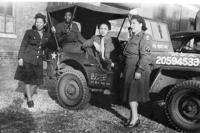MADISON, Wis. (AP) — Voters in Wisconsin could be seeing double on Election Day if the practice of fusion voting — which allows the same candidate to appear on the ballot under multiple party lines — makes a comeback in the battleground state.
A lawsuit filed Tuesday seeks to legalize the practice, saying it would empower independent voters and lesser-known political parties at a time of increasingly bitter partisanship between Republicans and Democrats. The lawsuit comes just four weeks after the that broke records for spending and saw massive involvement from the two parties and partisan interests.
Common in the 1800s, fusion voting means a candidate could appear on the ballot as nominated by Republican or Democratic parties and one or more lesser-known political parties. Critics argue it complicates the ballot, perhaps confusing the voter, while also giving minor parties disproportionate power because major-party candidates must woo them to get their endorsements.
Currently, full fusion voting is only happening in Connecticut and New York. There are efforts to revive the practice in other states, including Michigan, Kansas and New Jersey.
The lawsuit by the newly formed group United Wisconsin seeks a ruling affirming that minor parties can nominate whoever they like — even if that person was nominated by the Republican or Democratic parties. Under fusion voting, “John Doe, Democrat” could appear on the same ballot with “John Doe, Green Party.” All of the votes that candidate receives are combined, or fused, for their total.
United Wisconsin wants to become a fusion political party that will cross-nominate a major party candidate, said Dale Schultz, co-chair of the group and a former Republican Senate majority leader. But first, he said, “we’d like to see the state courts affirm that we have a constitutional right to associate with whomever we want.”
The lawsuit filed against the Wisconsin Elections Commission in Dane County Circuit Court argues the state's nearly 130-year-old prohibition on candidates appearing on the ballot more than once for the same office is unconstitutional.
Schultz is one of five named plaintiffs, which include a former Democratic county sheriff and a retired judge who was also a Republican state lawmaker.
Attorney Jeff Mandell, president of Law Forward, which is representing United Wisconsin in the lawsuit, said voters want more choices and called the current two-party system “calcified and deeply unstable.”
Fusion voting was common in the United States in the 1800s, a time when political parties nominated their preferred candidates without restriction. The practice helped lead to the creation of the Republican Party in 1854, when antislavery Whigs and Democrats, along with smaller parties, joined forces at a meeting in Wisconsin to create the GOP.
Less than 50 years later, in 1897, that same Republican Party enacted a prohibition on fusion voting in Wisconsin to weaken the Democratic Party and restrain development of additional political parties, the lawsuit contends. That's in violation of the state constitution’s equal protection guarantee, United Wisconsin argues.
Similar anti-fusion laws began to take hold nationwide early in the early 1900s as the major political parties moved to reduce the influence and competition from minor parties.








































